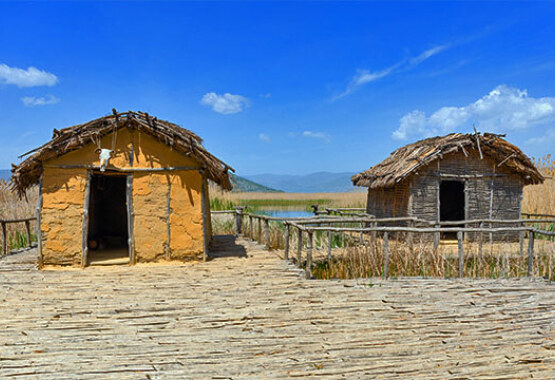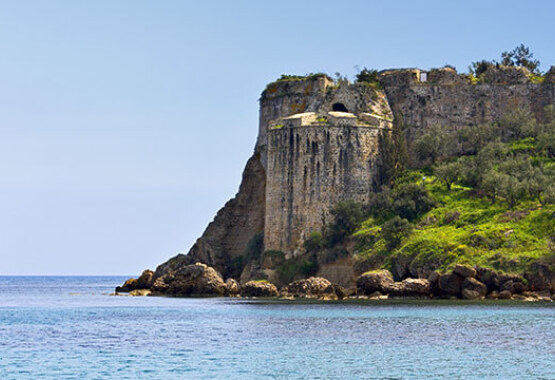
VERIA
Excavations have brought important settlements and burial sites to light, the size of which indicates the presence of a large population. Artistically skilled handicrafts and rich jewellery are evidence of the prosperity and importance of the region.
Herodotus mentions the noble family of Temenus, natives of Argos, as prominent founding settlers of the city, whose lineage supposedly descended from Hercules himself (they were also known as Heracleidae). Under Perdiccas 1st, a descendant of Temenus, Aigai became the seat of the Macedonian dynasty and one of the strongest centres of the ancient world. The gold ‘kterismata’ (grave offerings) of the necropolis, of unimaginable beauty, are irrefutable evidence of its prosperity, its importance and the historical span of Aigai. For three whole centuries, until the 4th century BC it was the spiritual, artistic and administrative centre of Macedonia, before handing over the reins to Pella.
Gold and ivory beds, delicate frescoes, gold reliquaries (‘larnakes’) of indescribable beauty, royal weaponry, ivory reliefs carved with great artistry, all of these archaeological findings which have been brought to light reveal the glory, power and importance of the dynasty which, under the leadership of Alexander, spread to the farthest corners of the then known world.
A journey to Vergina is a journey into the light. This light, which shines so brightly from the golden sun of Vergina, symbolizes the shining Macedonian civilisation.
Archaeological Site of Aigai
Discover the royal metropolis of the Macedonians
In 1977, on the southern Macedonia plain, 80 km southeast of Thessaloniki, at the foot of Pierian Mountains, one of the greatest archaeological discoveries of all time was made. The ancient city of Aigai, the first capital of the kingdom of Macedonia was brought to light. The richness of the finds is rare and of incalculable archaeological and historical importance, so much so that the territory of the kings of Macedonia, the land of Philip and Alexander, Eurydice and Olympia, were designated a World Heritage Site by UNESCO in 1996.The centuries create Vergina
The archaeological findings indicate that the area of Vergina was inhabited by the first settlers as early as the third millennium BC. The fertile plains, the plentiful water supply and its natural fortifications were ideal conditions in which to create a thriving city. The name "Aigai" reflects the wealth of the region, since it means "land of many flocks". In the Iron Age, from the 11th to the 7th century BC, the wider area of Aigai was a large residential centre.Excavations have brought important settlements and burial sites to light, the size of which indicates the presence of a large population. Artistically skilled handicrafts and rich jewellery are evidence of the prosperity and importance of the region.
Herodotus mentions the noble family of Temenus, natives of Argos, as prominent founding settlers of the city, whose lineage supposedly descended from Hercules himself (they were also known as Heracleidae). Under Perdiccas 1st, a descendant of Temenus, Aigai became the seat of the Macedonian dynasty and one of the strongest centres of the ancient world. The gold ‘kterismata’ (grave offerings) of the necropolis, of unimaginable beauty, are irrefutable evidence of its prosperity, its importance and the historical span of Aigai. For three whole centuries, until the 4th century BC it was the spiritual, artistic and administrative centre of Macedonia, before handing over the reins to Pella.
Living history
The traveller who is lucky enough to visit the archaeological site of Aigai will be thrilled by the splendour of the Macedonians dynasty. The royal tombs, the cemetery of burial mounds with the abundant offerings from the Iron Age, the Palace, the Theatre, the Temple of Eucleia, the Acropolis and the city wall, are the living history of the Macedonian kingdom.Gold and ivory beds, delicate frescoes, gold reliquaries (‘larnakes’) of indescribable beauty, royal weaponry, ivory reliefs carved with great artistry, all of these archaeological findings which have been brought to light reveal the glory, power and importance of the dynasty which, under the leadership of Alexander, spread to the farthest corners of the then known world.
A journey to Vergina is a journey into the light. This light, which shines so brightly from the golden sun of Vergina, symbolizes the shining Macedonian civilisation.




